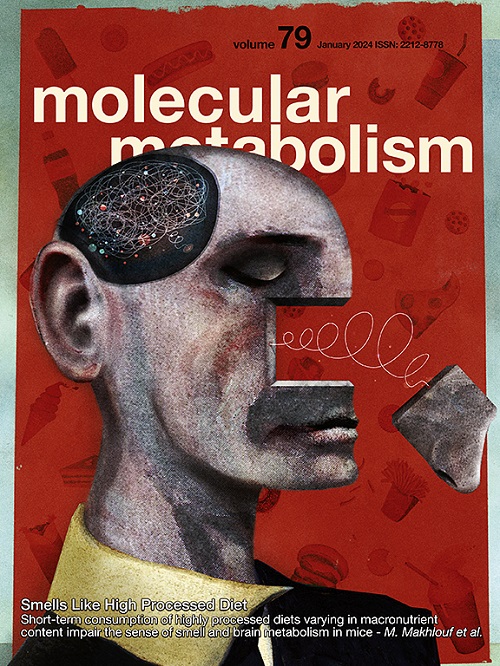Leukocyte-type 12/15-lipoxygenase is essential for timely inflammation-resolution and effective tissue regeneration following skeletal muscle injury
IF 6.6
2区 医学
Q1 ENDOCRINOLOGY & METABOLISM
引用次数: 0
Abstract
Objectives
Unlike traditional anti-inflammatory therapies which may interfere with musculoskeletal tissue repair, pharmacological administration of specialized pro-resolving lipid mediators (SPMs) promotes timely resolution of inflammation while stimulating skeletal muscle regeneration. Despite this, the potential role of endogenous inflammation-resolution circuits in skeletal muscle injury and repair remains unknown.
Methods
We investigated the effect of whole-body knockout of leukocyte-type 12/15-lipoxygenase (12/15-LOX) on acute inflammation and regeneration in vivo following skeletal muscle injury in mice. We further tested the impact of 12/15-LOX deficiency on polarization of bone marrow-derived macrophages and differentiation of myogenic progenitor cells in vitro.
Results
Alox15−/− mice displayed lower intramuscular concentrations of 12/15-LOX-derived lipid mediators than wild type (WT) mice, and this was associated with chronic low-grade muscle inflammation. Alox15-/- mice mounted an exaggerated acute immune response to sterile skeletal muscle injury which was associated with a local imbalance of pro-inflammatory vs. pro-resolving lipid mediators. Alox15−/− mice also displayed defects in myogenic gene expression, myofiber size, and myonuclear accretion. Mechanistically, bone marrow-derived macrophages (MФ) obtained from Alox15−/− mice produced less 12/15-LOX-derived lipid mediators and this was associated with impaired M2 polarization. Isolated myogenic progenitor cells also produced many LOX metabolites in response to long chain polyunsaturated fatty acid (LC-PUFA) supplementation, including bioactive SPMs. Alox15−/− myoblasts were both impaired in their ability to produce SPMs and were insensitive to the stimulatory effect of LC-PUFAs on in vitro myogenesis.
Conclusions
12/15-LOX is essential for timely resolution of acute inflammation and direct determination of myogenic progenitor cell fate following skeletal muscle injury.
白细胞型12/15脂氧合酶是骨骼肌损伤后及时解决炎症和有效组织再生所必需的。
与传统的抗炎疗法可能干扰肌肉骨骼组织修复不同,专门的促溶解脂质介质(SPMs)的药理管理可以促进炎症的及时解决,同时刺激骨骼肌再生。尽管如此,内源性炎症消退回路在骨骼肌损伤和修复中的潜在作用仍然未知。在这里,我们研究了全身敲除白细胞型12/15-脂氧合酶(12/15-LOX)对小鼠骨骼肌损伤后急性炎症和再生的影响。在肌肉损伤之前,Alox15-/-小鼠的肌肉内12/15- lox衍生的脂质介质浓度低于野生型(WT)小鼠,这与慢性低度肌肉炎症有关。Alox15-/-小鼠对无菌骨骼肌损伤表现出夸张的急性免疫反应,这与促炎与促溶脂质介质的局部失衡有关。在再生阶段,Alox15-/-小鼠在肌原性基因表达、肌纤维大小和肌核增生方面表现出缺陷。从机制上讲,从Alox15-/-小鼠获得的骨髓来源的巨噬细胞(MФ)产生较少的12/15- lox来源的脂质介质,这与M2极化受损有关。在长链多不饱和脂肪酸(LC-PUFA)补充下,分离的肌源性祖细胞也产生了许多LOX代谢物,包括生物活性SPMs。Alox15-/-肌母细胞产生SPMs的能力受损,并且对LC-PUFAs对体外肌生成的刺激作用不敏感。这些数据表明,12/15-LOX通路对于及时解决急性炎症和直接确定骨骼肌损伤后的肌源性祖细胞命运至关重要。
本文章由计算机程序翻译,如有差异,请以英文原文为准。
求助全文
约1分钟内获得全文
求助全文
来源期刊

Molecular Metabolism
ENDOCRINOLOGY & METABOLISM-
CiteScore
14.50
自引率
2.50%
发文量
219
审稿时长
43 days
期刊介绍:
Molecular Metabolism is a leading journal dedicated to sharing groundbreaking discoveries in the field of energy homeostasis and the underlying factors of metabolic disorders. These disorders include obesity, diabetes, cardiovascular disease, and cancer. Our journal focuses on publishing research driven by hypotheses and conducted to the highest standards, aiming to provide a mechanistic understanding of energy homeostasis-related behavior, physiology, and dysfunction.
We promote interdisciplinary science, covering a broad range of approaches from molecules to humans throughout the lifespan. Our goal is to contribute to transformative research in metabolism, which has the potential to revolutionize the field. By enabling progress in the prognosis, prevention, and ultimately the cure of metabolic disorders and their long-term complications, our journal seeks to better the future of health and well-being.
 求助内容:
求助内容: 应助结果提醒方式:
应助结果提醒方式:


